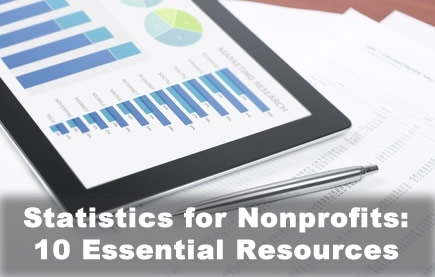We love statistics for a reason. They break down our complex ideas to simple numbers and make our work measurable. You don’t need a statistic to know how much statistics help your nonprofit – to backing up the need for your work with real community indicators, to measuring and tracking your impact and comparing yourself to the competition. Statistics are powerful add-ons to boost your fundraising.
The key is to use grounded, reputable sources. Here are 10 essential resources to get the best statistics for your nonprofits to show impact and need for your work.
Census Bureau
The Census Bureau not only has all the information you need regarding community and regional demographics, but it now has interactive apps and cool programs on its website to make statistics fun! A “quickfact” on the homepage, for instance, shares that “In New York City, New York 58.2% of females 16 years+ are in the civilian labor force.” You can also see a ticking “population timeclock” that automatically updates both the US and global population to the mili-second.
Bureau of Labor Statistics
The BLS is the most comprehensive compilation of labor and unemployment statistics. The data is detailed, current, and highly informative, to the level of pinpointing the best careers in which to work and what their median salaries are anywhere in the United States.
Pew Research Center
Pew manages some of the best objective research initiatives in the country. Their research on communication, for instance, tracks trends in social media use across the country and how people use technology to communicate. They also research interesting areas such as youth living arrangements – publishing in May 2016 that, for the first time since 1880, youth 18-34 are more likely to live with their parents than with a partner or spouse (32.1% to 31.6%). The applications of Pew’s data to spice up your case statements is endless. The best part is that Pew is a nonprofit and all research reports are free.
The CDC
If you need any health indicators for anywhere in the United States, from mental health to diabetes, go here first. They even publish a state by state “Breastfeeding Report Card”.
The National Institute of Health
The NIH has a comprehensive data library for research, data, and statistics on mandated studies. The Big Cities Health Data Inventory, for example, has comprehensive health data across 39 indicators for 26 cities. It has more than 12,000 data sets.
The Rand Corporation
An independent, nonprofit think tank, Rand studies controversial issues that often involve nonprofits or the need for nonprofit work. Rand’s policy foci are broad as well, from energy and environment to topics on population and aging. For instance, they published a study in May 2016 on “Ten Frequently Asked Questions about Veterans’ Transitions” that found interesting data that veterans earn more than demographically comparable citizens that did not serve.
World Bank
The World Bank tracks and publishes comprehensive country data toward meeting millennium development goals and just tracking country economic health. You can even see how many CO2 emissions a country has per capita.
City-Data.com
This is a one stop shop that compiles data from multiple sources to pull up comprehensive information on any city in the United States. Information includes how schools perform, population and demographics, crime trends, and employment indicators. It has cool interactive map features as well to make it easy to use.
IBIS World
IBIS provides detailed industry reports for all industries in America and many globally, by NAICS codes. You can download an entire report with detailed statistics and graphics on just the status of “Sports Coaching in the U.S.”, for instance. That sector has a 1.4% growth rate and includes 73,095 businesses. While you can see snapshots and limited data for free, you do have to pay for complete reports. If you need specific statistics on a particular industry though, it is probably worth the cost.
Statista
Statista compiles statistics and good charts for just about anything you can think of. If you are stuck and need some data points to make your presentation more interesting or your proposal more compelling, you might look here. You can see how many people eat McDonald’s to prices of gas in different areas, along with full scale industry reports. If you just type in McDonald’s in their search engine, for instance, you get a list of dozens of hits, like this cool infographic on their global revenues. You do have to register to receive some free reports, and you might have to become a paying member for specific information.
If you are just trying to spice up your board and donor presentations, make your appeals more interesting, or write stronger case statements for grant funding, use these 10 essential resources to get the statistics that can help you do so.

